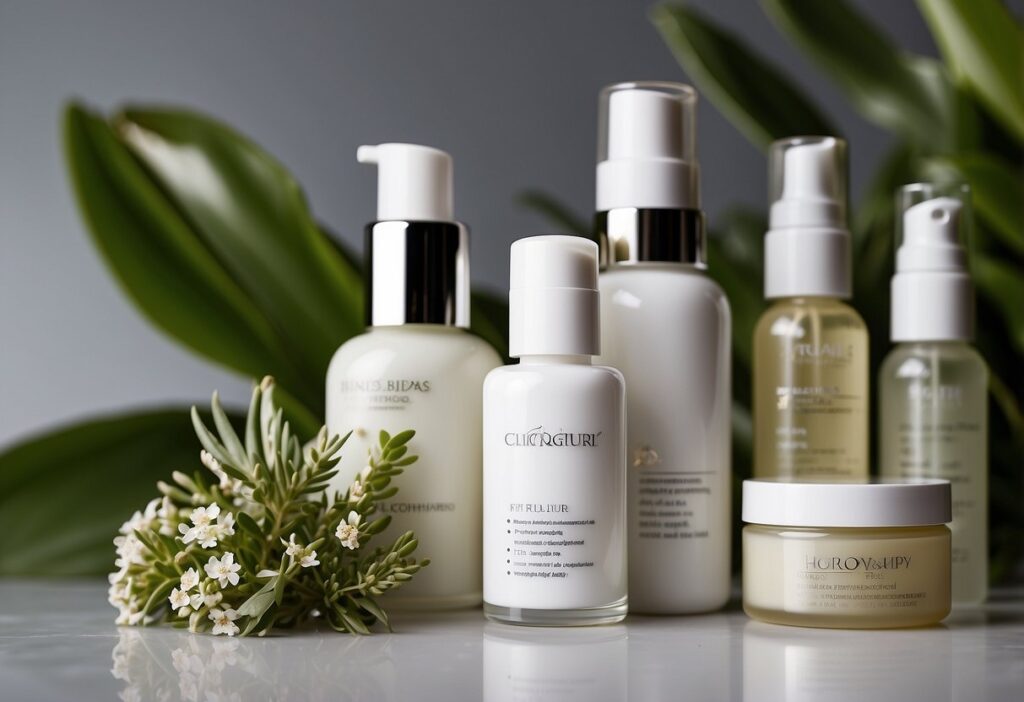Why Is Skin Care Important: Essential Benefits for Your Health and Confidence
Real Comparisons Editor Team
on
July 19, 2024

Healthy skin isn’t just about aesthetics; it’s a crucial part of overall health and well-being. Skincare helps protect against harmful environmental factors, such as UV rays and pollution, which can lead to severe skin conditions. Regular skin care can also prevent premature aging, acne, and infections, ensuring your skin remains resilient and vibrant.
It’s important to understand your skin type to tailor an effective skincare routine. Different skin types have unique needs and knowing whether you have dry, oily, combination, or sensitive skin can help you choose the right products. Establishing a consistent regimen with essential steps like cleansing, moisturizing, and applying sunscreen can make a significant difference.
Investing time in skincare is a proactive step to maintain your skin’s health and appearance. By considering professional treatments and addressing specific concerns early on, you can enjoy long-term benefits. This approach can foster both confidence and comfort in your skin, making it well worth the effort.
Key Takeaways
- Skincare protects against harmful environmental factors.
- Understanding your skin type helps create an effective routine.
- Regular care prevents aging, acne, and infections.
Why Is Skin Care Important
Skin Health: The skin is the largest organ of the body and acts as a barrier against infections, pollutants, and harmful agents. Proper skin care helps maintain the integrity of this barrier.
Hydration: Keeping the skin hydrated prevents dryness and irritation. Moisturizing daily can aid in maintaining the skin’s elasticity and smoothness.
Prevent Premature Aging: Using sunscreen and anti-aging products can reduce signs of aging, such as wrinkles and age spots. This can help the skin remain youthful and resilient.
Treat and Prevent Skin Conditions: Regular skin care routines can alleviate and prevent common skin conditions like acne, eczema, and dermatitis. Cleaning and nourishing the skin can reduce irritation and flare-ups.
Boost Confidence: Clear, healthy skin can enhance personal confidence and self-esteem. Individuals often feel more comfortable in social and professional situations when their skin appears well-maintained.
| Benefit | Description |
|---|---|
| Protection | Shields against environmental harm |
| Hydration | Maintains moisture, preventing dryness and irritation |
| Aging Prevention | Reduces wrinkles and age spots |
| Condition Management | Treats and prevents acne, eczema, and other conditions |
| Confidence Boost | Enhances personal self-esteem |
Improved Skin Texture: Regular exfoliation and the use of serums can help achieve smoother, more even skin. This encourages the natural shedding process of dead skin cells.
Reduces Risk of Skin Cancer: Proper use of sunscreen and avoiding excessive sun exposure can diminish the risk of developing skin cancer. It is essential to choose products with broad-spectrum protection.
Personal Hygiene: A good skincare routine is a part of personal hygiene, ensuring the removal of sweat, dirt, and oil. This keeps the skin clean and reduces the risk of infections.
Implementing a consistent skin care routine can lead to healthier, more resilient skin.
Benefits Of Skin Care
Healthy Appearance
Proper skin care can maintain a healthy and radiant look. Clean and hydrated skin often appears smoother and more youthful.
Prevention of Skin Issues
Regular skin care routines can help prevent issues like acne, eczema, and wrinkles. Addressing these proactively can reduce the need for more intensive treatments later.
Protection Against Environmental Damage
Using products with SPF and antioxidants can protect the skin from harmful UV rays and pollutants. This can reduce the risk of skin cancer and other damage.
Enhanced Self-Confidence
When the skin looks good, individuals often feel more confident. This boost in self-esteem can impact daily interactions and overall well-being.
Better Absorption of Products
Well-cared-for skin can absorb topical products more effectively. Clean and exfoliated skin allows for deeper penetration of active ingredients, enhancing their benefits.
Improved Skin Texture
Regular exfoliation and moisturization can improve skin texture. This leads to softer, more even skin, which can be more comfortable and pleasing to touch.
Slower Signs of Aging
Consistent use of anti-aging products can reduce fine lines and wrinkles. Ingredients like retinol and hyaluronic acid can help maintain a youthful appearance.
Reduction of Dark Spots
Skin care routines that include brightening agents can reduce dark spots and hyperpigmentation. Ingredients like vitamin C and niacinamide help even out skin tone.
Relief from Skin Conditions
Specialized skin care can provide relief from conditions like rosacea and psoriasis. Using appropriate products can soothe irritation and reduce flare-ups.
Understanding Your Skin: Types Of Skin
Different skin types require unique care. Identifying your skin type is vital for effective skincare.
Normal Skin
Normal skin has a balanced texture, neither too oily nor too dry. It feels comfortable and rarely breaks out.
Oily Skin
Oily skin produces an excess amount of sebum, leading to a shiny appearance. It is more prone to acne and enlarged pores.
Dry Skin
Dry skin lacks sufficient moisture, causing it to feel tight and rough. It may exhibit flakiness and sensitivity.
Combination Skin
Combination skin features both oily and dry areas. The T-zone (forehead, nose, chin) is typically oily, while the cheeks are dry.
Sensitive Skin
Sensitive skin reacts easily to products and environmental factors. It often appears red, itchy, and may sting when using new skincare products.
Quick Comparison Table
Skin Type | Characteristics | Care Tips |
Normal | Balanced, comfortable | Maintain a regular skincare routine |
Oily | Shiny, prone to acne | Use oil-free products |
Dry | Tight, rough, flaky | Opt for hydrating and moisturizing |
Combination | Oily T-zone, dry cheeks | Target care to specific areas |
Sensitive | Red, itchy, easily irritated | Use gentle, hypoallergenic products |
Understanding these skin types helps in choosing the right products and routines. Knowing your skin type ensures better care and healthier skin.
Types Of Skin Care Routine

Skin care routines vary based on the time of day, focusing on different needs and benefits for the morning and nighttime. Both routines aim to maintain healthy skin but emphasize distinct steps and products.
Morning
In the morning, a skin care routine prioritizes protection and hydration. Cleansing the face removes any nighttime oils or impurities. Using a toner helps to balance the skin’s pH, followed by a serum that targets specific issues like pigmentation or fine lines. Moisturizing ensures the skin is well-hydrated throughout the day.
Sunscreen is a crucial step to protect the skin from harmful UV rays, which can lead to premature aging and skin cancer. An eye cream might be used to reduce puffiness and dark circles. Optional steps include applying antioxidants to defend against environmental damage.
Night
A night-time skin care routine emphasizes repair and regeneration. It begins with cleansing, often using a double-cleanse method: an oil-based cleanser to remove makeup and sunscreen, followed by a water-based cleanser to clean deeper impurities. This is followed by a toner to prep the skin for the next steps.
Serums at night typically contain ingredients like retinol or peptides that aid in cell turnover and repair. Moisturizing remains key, but a heavier, more nourishing cream is often preferred. Adding a night cream or mask can provide extra hydration and nutrients. An eye cream helps to target specific under-eye concerns, like wrinkles or dark circles.
Essential Steps In A Skincare Routine
A skincare routine helps maintain healthy and vibrant skin by removing impurities, balancing the skin’s pH, and providing moisture.
Cleanser
A cleanser removes dirt, oil, and impurities from the skin. It’s essential for preventing clogged pores and breakouts. People should use a cleanser suitable for their skin type—foaming cleansers for oily skin, cream cleansers for dry skin, and gel cleansers for combination skin.
Using a cleanser twice daily—morning and night—ensures that the skin remains clean and ready to absorb other skincare products. It’s important to use lukewarm water to avoid stripping the skin of its natural oils. The right cleanser can leave the skin feeling fresh and prepped for the next steps in the skincare routine.
Toner
A toner balances the skin’s pH levels and removes any remaining impurities after cleansing. It also prepares the skin to better absorb moisturizers and serums. Alcohol-free toners are recommended to prevent drying out the skin.
Toners with ingredients like witch hazel or rose water can soothe and hydrate the skin. Patting the toner gently onto the skin with a cotton pad or hands allows for better absorption. Using a toner can leave the skin feeling refreshed and ready for the next step.
Moisturizer
A moisturizer hydrates the skin, keeping it soft and supple. Different formulations—creams, gels, lotions—suit varying skin types. For instance, a lightweight gel moisturizer might be preferable for oily skin, while a rich cream works well for dry skin.
Moisturizing helps to protect the skin’s barrier and prevent moisture loss. Applying moisturizer while the skin is still slightly damp helps to lock in hydration. Using a moisturizer consistently can lead to healthier, more radiant skin.
When To Consider Professional Treatments For Your Skin
Professionally administered skin treatments can be essential in certain circumstances. If over-the-counter products fail to address specific concerns, seeking professional help can offer targeted solutions.
Persistent acne or severe breakouts warrant a consultation with a dermatologist. They can prescribe stronger medications or recommend treatments like chemical peels and laser therapy.
Signs to Consider Professional Treatments:
- Severe acne
- Hyperpigmentation
- Persistent redness
- Deep wrinkles
- Scarring
Skin conditions like rosacea or eczema often require specialized care. Dermatologists and estheticians have the expertise to manage and treat these conditions effectively.
Aging signs, such as deep wrinkles and sagging skin, benefit from professional interventions. Treatments like Botox, fillers, and microneedling can provide significant improvements.
Professional Treatments Offer:
- Expert diagnosis
- Customized treatment plans
- Advanced techniques
Individuals with stubborn dark spots or uneven skin tone may find relief through specialized treatments. Options like IPL (Intense Pulsed Light) and chemical peels can address these issues.
Professional treatments are also advisable for those seeking maintenance and prevention. Regular visits can help monitor skin health and catch potential issues early.
Itching, burning, or allergic reactions to skincare products suggest the need for professional advice. A dermatologist can recommend suitable alternatives and perform allergy tests if necessary.
Considering professional treatments for your skin can lead to more effective and lasting results when dealing with specific or persistent issues.
Summary
Committing to a skincare routine offers numerous long-term benefits, including healthier skin and improved physical and psychological well-being. Neglecting skin care can lead to various complications.
Regular skin care routines can enhance the appearance and texture of the skin, making it smoother and more radiant. Good skin care habits include cleansing, moisturizing, and applying sunscreen to shield against harmful UV rays.
Frequently Asked Questions
What are the long-term benefits of committing to a skin care routine?
Regular skin care can reduce the risk of skin issues such as acne, wrinkles, and dryness. Consistent routines maintain skin hydration, elasticity, and a youthful appearance.
What could be the potential skin complications of neglecting a skin care regimen?
Neglecting skin care can lead to various problems such as premature aging, acne, and chronic dryness. Long-term neglect may contribute to more serious issues like infections or skin diseases.
How do dermatologists justify the importance of investing in skin care?
Dermatologists emphasize prevention as a key benefit. Investing in skin care helps avoid costly treatments later. They highlight that proper skin care contributes significantly to both aesthetic and health outcomes.
- Category: Skin Care
